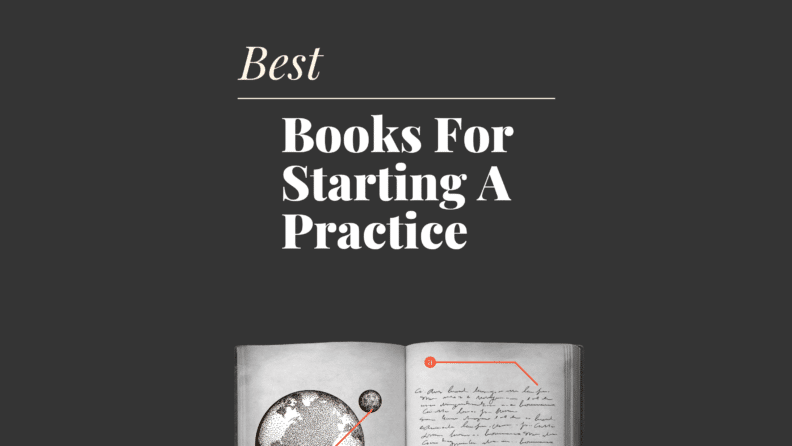Discovering the best books for starting a medical practice has been instrumental in launching my own. These resources, ideal for medical students to seasoned doctors, cover crucial topics like HR strategies, tech integration, and social media use. This selection offers clear advice for managing a successful medical office. Rely on these books to embrace modern medical practices and technology, ensuring a smooth start to your venture.
17 Best Books For Starting A Medical Practice
I’ve delved into numerous books and have handpicked a selection designed to address the unique challenges you’re facing in starting a medical practice.
- Start Your Own Medical Practice by Judge Huss
- The Medical Entrepreneur by Steven M. Hacker MD
- Business Basics for Private Practice by Anne D. Bartolucci
- Starting, Owning, and Buying a Medical Practice by Max Reiboldt
- The Lean Startup: How Today's Entrepreneurs Use Continuous Innovation to Create Radically Successful Businesses by Eric Ries
- Physician Entrepreneurs: The Quality Patient Experience by Wendy Leebov EdD
- The Business Side of Medicine by Tom Harbin
- The E-Myth Physician by Michael E. Gerber
- Doctors in the Making by Suzanne Poirier
- Owning Medical Practices by Marc Halley
- A Guide to Starting Your Own Complementary Therapy Practice by Elaine Mary Aldred
- Doctors Talking with Patients/Patients Talking with Doctors by Debra L. Roter and Juditha Hall
- Healthcare Kaizen by Mark Graban and Joseph E. Swartz
- Understanding Value-Based Healthcare by Christopher Moriates, Vineet Arora, and Neel Shah
- Critical Decisions: How You and Your Doctor Can Make the Right Medical Choices Together by Peter A. Ubel
- The Checklist Manifesto: How to Get Things Right by Atul Gawande
- How Doctors Think by Jerome Groopman
Overviews Of The 17 Best Books For Starting A Medical Practice
1. Start Your Own Medical Practice by Judge Huss
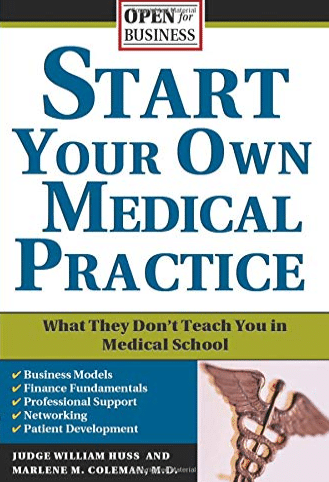
Summary:
Judge Huss offers a comprehensive guide for medical professionals looking to start their own practice. The book delves deep into the intricacies of the business side of medicine, a topic often overlooked in traditional medical school curriculums. With actionable advice on legal matters, financing, office setup, and more, it’s a one-stop resource for anyone venturing into medical entrepreneurship.
What You'll Learn:
You'll gain insights into the process of setting up your own medical practice, from the initial steps of creating a business plan, securing finances, and understanding legal implications, to practical advice on office management, staffing, and patient care.
Why You Should Read It:
If you're a medical professional with dreams of setting up your own clinic or practice, this book offers invaluable insights that can save you time, money, and potential pitfalls. With Judge Huss's guidance, you'll feel more confident in making the leap from practitioner to entrepreneur.
Quote From The Book:
"Setting up your own practice is not just about being a good doctor. It’s about understanding and navigating the world of business and ensuring that your medical expertise translates into a successful and sustainable practice."
About The Author:
Judge Huss is a recognized expert in the field of medical entrepreneurship. With years of experience in guiding medical professionals, he has a deep understanding of the challenges and rewards of setting up a medical practice.
2. The Medical Entrepreneur by Steven M. Hacker
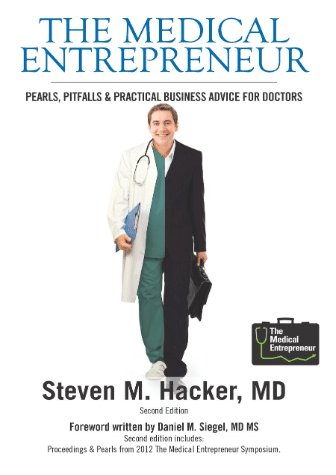
Summary:
In "The Medical Entrepreneur," Steven M. Hacker provides a wealth of insight into the entrepreneurial aspects of medical practice. The book is filled with practical business advice, illustrated with real-world examples and case studies, aimed at physicians looking to start their own medical practice or healthcare-related startup.
What You'll Learn:
In this book, readers will learn the essentials of medical entrepreneurship, including how to avoid common pitfalls, manage finances effectively, understand legal and ethical considerations, and strategically plan operations for a new medical practice or healthcare-related venture. The book emphasizes practical guidance, providing actionable steps for physicians to transform their medical expertise into successful entrepreneurial journeys.
Why You Should Read It:
For doctors aspiring to venture into the world of medical entrepreneurship, this book acts as a comprehensive guide, offering practical, actionable advice and insights from a seasoned medical entrepreneur. Hacker's experience and guidance will be invaluable in navigating the multifaceted challenges of starting and managing a medical venture.
Quote From The Book:
"Medical entrepreneurship is not merely about clinical proficiency; it’s about mastering the business acumen needed to thrive in the competitive landscape of healthcare."
About The Author:
Steven M. Hacker is a renowned medical entrepreneur and author with extensive experience in establishing and managing medical practices and healthcare startups.
3. Business Basics for Private Practice by Anne D. Bartolucci
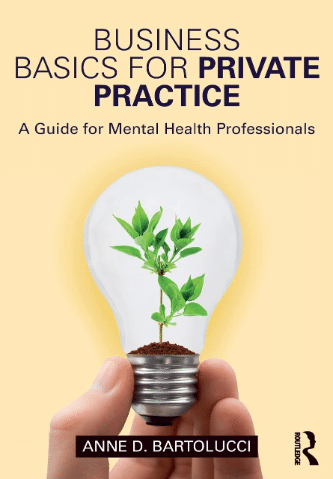
Summary:
Business Basics for Private Practice by Anne D. Bartolucci unravels the mysteries of running a successful private practice. This insightful book offers tangible strategies and techniques that healthcare practitioners can implement to manage their practices efficiently. It acts as a comprehensive guide, aiding in navigating the multifaceted aspects of private medical practice from a business perspective, making it an invaluable asset for both novices and seasoned practitioners.
What You'll Learn:
In this enlightening read, you will grasp insights into the various elements essential for running a successful private practice. You'll acquire knowledge on business planning, legal considerations, financial management, marketing strategies, and essential administrative tasks, thus enabling you to offer top-notch services to your patients while maintaining a healthy bottom line.
Why You Should Read It:
This book stands out due to its precise, straightforward, and practical approach to the business side of private practice. Anne D. Bartolucci employs her extensive knowledge to present key business concepts in a digestible manner, allowing healthcare professionals to focus on patient care without being overwhelmed by administrative hassles. Reading this book is a step towards building a resilient and profitable practice that can withstand the ever-evolving healthcare landscape.
Quote From The Book:
"The journey of establishing your private practice is challenging yet rewarding, encompassing not just medical proficiency but also entrepreneurial acumen."
About The Author:
Anne D. Bartolucci is a seasoned psychologist and a well-respected author in the field of private medical practice management.
4. Starting, Owning, and Buying a Medical Practice by Max Reiboldt
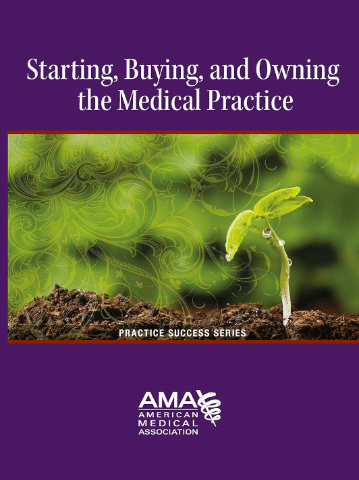
Summary:
Max Reiboldt's book is a comprehensive guide for medical professionals who are navigating the complexities of starting, owning, or buying a medical practice. This insightful book, part of the AMA's Practice Success Series, offers a detailed overview of the essential business considerations and challenges associated with establishing and running a successful medical practice, including financing, legal issues, and operational management.
What You'll Learn:
This book imparts crucial knowledge about the multiple facets of establishing and maintaining a medical practice, covering essential aspects such as acquiring initial financing, addressing legal requirements, and managing operational aspects effectively. It presents in-depth information and practical advice on various paths a medical professional can take, whether starting a new practice, buying an existing one, or managing ownership transitions.
Why You Should Read It:
If you are contemplating starting, owning, or buying a medical practice, this book is a vital resource that provides extensive knowledge and practical insights from an industry expert. Max Reiboldt’s expert guidance will help medical professionals navigate through the maze of challenges and decisions they will face in their entrepreneurial journey, enabling them to build and manage a prosperous medical practice.
Quote From The Book:
"In the dynamic field of healthcare, knowledge is power, and understanding the business intricacies of starting and running a medical practice is paramount to long-term success."
About The Author:
Max Reiboldt is a seasoned expert in the field of medical practice management and healthcare consultancy.
5. The Lean Startup: How Today's Entrepreneurs Use Continuous Innovation to Create Radically Successful Businesses by Eric Ries
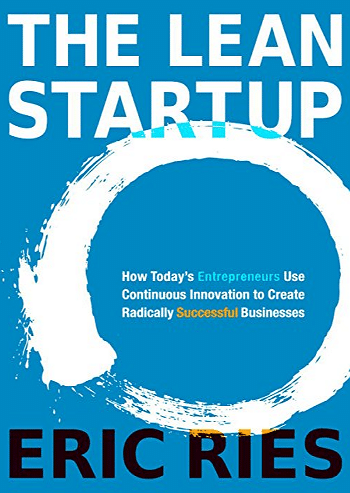
Summary:
Eric Ries's "The Lean Startup" is not just for tech entrepreneurs but is a fundamental read for anyone looking to introduce an innovative approach to business development, including medical professionals. This groundbreaking book introduces the principles of Lean Thinking to entrepreneurship, advising on how to drive a startup—how to steer, when to turn, and when to persevere—and grow a business with maximum acceleration.
What You'll Learn:
Eric Ries articulates a systematic, scientific approach to creating and managing successful startups in an age when companies have to innovate more than ever. You will learn about the concept of “validated learning,” the Build-Measure-Learn feedback loop, and various innovative strategies that help in making informed decisions during the initial phases of a startup, making it applicable to medical professionals considering innovative healthcare ventures.
Why You Should Read It:
This book is essential for anyone looking to start a new venture in the medical field because it provides insights and methodologies to test and adapt innovative ideas rapidly. Medical professionals will find value in learning how to adopt Lean Thinking to avoid common pitfalls that startups face, ensuring that their innovative healthcare solutions are sustainable and successful in the long term.
Quote From The Book:
"Startup success can be engineered by following the right process, which means it can be learned, which means it can be taught."
About The Author:
Eric Ries is a pioneer in the world of entrepreneurial methodology. He has provided a roadmap for innovation and entrepreneurship that is reshaping the way companies are built and new products are launched.
6. Physician Entrepreneurs: The Quality Patient Experience by Wendy Leebov EdD
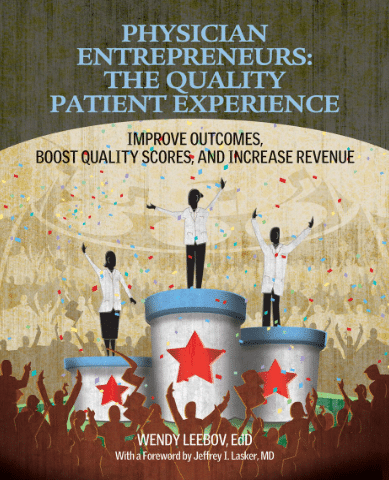
Summary:
Wendy Leebov, in her book "Physician Entrepreneurs: The Quality Patient Experience," offers an innovative approach to medical practice. This book delves deep into the importance of quality patient experiences, exploring how it can substantially improve outcomes, boost quality scores, and essentially, increase revenue. It’s a rich resource for physician entrepreneurs looking to create a patient-centered medical practice.
What You'll Learn:
In this insightful book, you will learn the importance of focusing on quality patient experiences and their implications on clinical outcomes and practice reputation. The book provides strategies and practical advice on how to enhance patient satisfaction, improve outcomes, and create a thriving, patient-centric medical practice, eventually leading to increased revenue and a solid reputation.
Why You Should Read It:
For physician entrepreneurs aspiring to make a significant impact, this book is crucial. It outlines the transformative approach of integrating quality patient experiences into the business model, which is vital in today’s healthcare landscape. Wendy Leebov’s practical advice and innovative strategies will guide medical professionals in building a healthcare practice that is both profitable and reputable.
Quote From The Book:
"Creating a patient-centered culture is the linchpin for improving outcomes, elevating quality scores, and increasing revenue in medical practice."
About The Author:
Wendy Leebov is a distinguished expert and author in the field of healthcare quality improvement and patient experience enhancement. Connect with her on LinkedIn.
7. The Business Side of Medicine by Tom Harbin
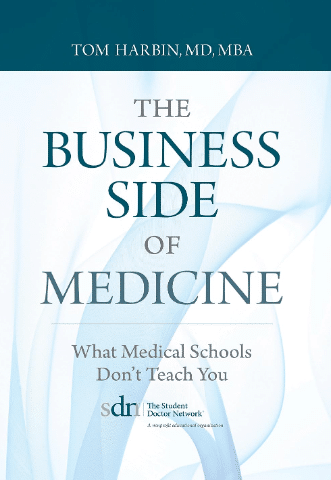
Summary:
Tom Harbin offers a deep dive into the often-overlooked aspects of running a medical practice. The book sheds light on the vital business elements that are generally not taught in medical schools, enabling medical professionals to blend clinical expertise with business acumen to run a successful practice. It is a robust resource for those looking to understand the complexities of managing the non-clinical aspects of medicine.
What You'll Learn:
This enlightening book uncovers the ins and outs of the financial, administrative, and managerial aspects of a medical practice. It imparts practical knowledge of efficient practice management, insurance navigation, billing protocols, and negotiation skills. With this book, you will gain the ability to maneuver through the business maze of the medical field, ensuring the sustainability and growth of your practice.
Why You Should Read It:
Tom Harbin's book is a revelation for medical professionals who find themselves grappling with the administrative quagmire of healthcare. Its approach is pragmatic and its insights are actionable, allowing physicians to mitigate risks and optimize operations. Reading this book is pivotal for those who aim to balance their commitment to patient care with the imperative need to sustain a viable practice.
Quote From The Book:
"In medicine, the fusion of clinical mastery and business intelligence is the cornerstone of a thriving practice."
About The Author:
Tom Harbin is a recognized ophthalmologist and a reputed author known for his expertise in medical practice management.
8. The E-Myth Physician by Michael E. Gerber
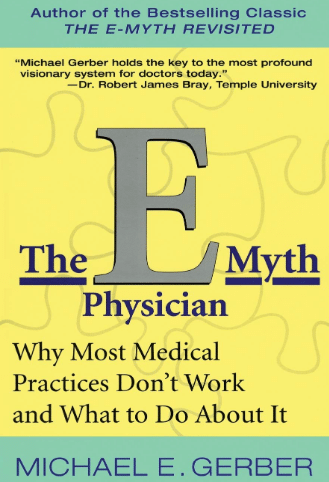
Summary:
Michael E. Gerber’s "The E-Myth Physician" takes a critical look at the entrepreneurial myth that haunts the majority of small businesses, including medical practices. He unveils why many medical practices struggle and provide actionable solutions to overcome common pitfalls. This book emphasizes the importance of viewing medical practices from an entrepreneurial perspective and sheds light on practical business strategies to enhance their success.
What You'll Learn:
You’ll learn the significance of systematic thinking in managing medical practices. Gerber’s model emphasizes the distinction between working on your practice and working in your practice. The book teaches how to implement strategic organizational frameworks, refine operational processes, and foster an entrepreneurial mindset to create a thriving, resilient medical practice.
Why You Should Read It:
This is a must-read for physicians who find themselves bogged down by the managerial aspects of running a practice. Michael E. Gerber’s innovative approach helps medical practitioners shift their perspective from being purely medical providers to becoming savvy business owners, enabling them to rejuvenate their practices and achieve entrepreneurial success in the healthcare sector.
Quote From The Book:
"The difference between great people and everyone else is that great people create their lives actively, while everyone else is created by their lives, passively waiting to see where life takes them next."
About The Author:
Michael E. Gerber is a world-renowned business author, entrepreneur, and thought leader who is widely recognized for his concepts and methodologies in business development and strategic innovation. Connect with him on LinkedIn.
9. Doctors in the Making: Memoirs and Medical Education by Suzanne Poirier

Summary:
Suzanne Poirier’s "Doctors in the Making: Memoirs and Medical Education" explores the journey of becoming a doctor through a collection of memoirs, providing a vivid and insightful perspective on medical education. The book delves into the experiences, challenges, and reflections of those in the medical field, offering a unique view into the lives of those who walk the path of medicine.
What You'll Learn:
In this enlightening collection, you will learn about the various challenges and triumphs encountered in the journey of medical education. The book offers deep reflections and insights from different perspectives within the medical field, allowing readers to gain an understanding of the emotional and intellectual journey involved in becoming a doctor, and how it shapes the practice of medicine.
Why You Should Read It:
This book is essential for aspiring doctors and medical practitioners as it provides a deeply human perspective on the process of medical education. Suzanne Poirier’s compilation of memoirs offers an opportunity to reflect on the personal and professional aspects of becoming a physician and the inherent dedication, compassion, and resilience required in the medical profession.
Quote From The Book:
"Each narrative is a reflection of an individual’s journey in medicine, a story of becoming, evolving, and learning in this ever-changing field."
About The Author:
Suzanne Poirier is a distinguished author and academic in the field of medical humanities.
10. Owning Medical Practices by Marc Halley
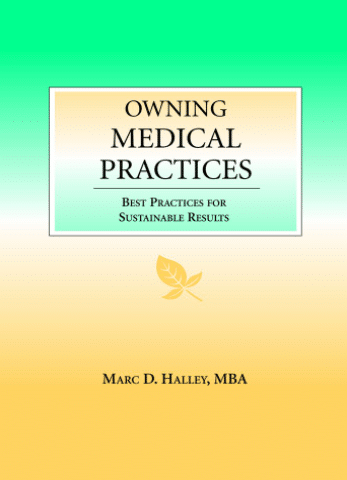
Summary:
It is a comprehensive guide aimed at medical professionals and administrators aspiring to achieve sustainable results in owning and managing medical practices. This book serves as a blueprint for creating and maintaining a successful medical practice, focusing on operational excellence, financial stability, and quality patient care.
What You'll Learn:
Marc Halley provides invaluable insights into strategic planning, operational efficiency, financial management, and quality improvement. The book uncovers the intricacies of medical practice ownership, emphasizing the development of robust management structures, effective patient care systems, and sound financial strategies. It offers a roadmap for establishing a medical practice that is resilient, patient-centered, and profitable.
Why You Should Read It:
This book is essential for medical practitioners and healthcare administrators who aim to navigate the multifarious challenges of owning a medical practice. Halley’s proven strategies and best practices empower readers to enhance operational procedures, improve patient satisfaction, and achieve sustainable results.
Quote From The Book:
"Sustainable results in medical practice ownership are achieved through a relentless pursuit of operational excellence, patient satisfaction, and financial acumen."
About The Author:
Marc Halley is a renowned authority on healthcare management and the owner of a successful healthcare consulting firm.
11. A Guide to Starting Your Own Complementary Therapy Practice by Elaine Mary Aldred

Summary:
Elaine Mary Aldred’s A Guide to Starting Your Own Complementary Therapy Practice is a must-read for healthcare professionals aiming to venture into the world of complementary therapy. This book is a comprehensive resource, offering step-by-step guidance on establishing, managing, and growing a successful complementary therapy practice, addressing various therapies such as acupuncture, reflexology, and massage therapy.
What You'll Learn:
Readers will gain profound insights into the fundamentals of complementary therapy practice, including the legalities, ethical considerations, and business aspects. Elaine elaborates on creating a business plan, marketing strategies, and managing finances effectively. The book also delves deep into developing interpersonal skills, building a client base, and maintaining a harmonious and professional therapeutic environment.
Why You Should Read It:
For those aspiring to build a career in complementary therapy, this book is a treasure trove of practical knowledge and expert advice. It presents a clear and concise overview of the practicalities involved in starting and running a successful therapy practice. Elaine Mary Aldred’s extensive experience and wisdom in complementary therapy make this guide an invaluable resource for achieving success in this field.
Quote From The Book:
"Creating a harmonious therapeutic environment is paramount in building trust and fostering healing in complementary therapy practice."
About The Author:
Elaine Mary Aldred is a distinguished practitioner and writer in the field of complementary therapy.
12. Doctors Talking with Patients/Patients Talking with Doctors by Debra L. Roter and Judith Hall
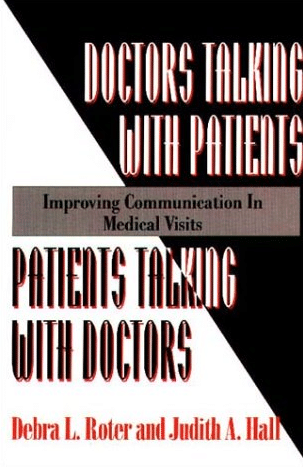
Summary:
Doctors Talking with Patients/Patients Talking with Doctors by Debra L. Roter and Judith Hall is a pivotal read focusing on enhancing the communication between doctors and patients. It provides insightful analysis and practical advice on creating more empathetic and efficient dialogues in medical visits, which are critical for accurate diagnosis and treatment adherence.
What You'll Learn:
This book elucidates the importance of effective communication in medical settings and provides practical strategies for both healthcare providers and patients to improve their interaction. The readers will explore various communication styles, understand the impact of efficient communication on healthcare outcomes, and learn techniques to overcome communication barriers.
Why You Should Read It:
Effective communication is the cornerstone of successful healthcare delivery. This book is indispensable for medical professionals and patients aiming to foster better understanding and collaboration during medical visits. The expert insights and practical advice offered by Roter and Hall enable readers to navigate medical conversations more effectively, thereby improving healthcare experiences and outcomes.
Quote From The Book:
"Empathetic communication builds a foundation of trust and mutual understanding, essential for effective doctor-patient interactions."
About The Author:
Debra L. Roter and Judith Hall are renowned experts in healthcare communication. Their extensive research and work in the field aim to enhance the quality of interactions between healthcare providers and patients, focusing on mutual understanding and empathetic communication.
13. Healthcare Kaizen by Mark Graban and Joseph E. Swartz

Summary:
Healthcare Kaizen focuses on the principles of Kaizen, a Japanese term meaning “change for the better,” and its application in the healthcare sector. The book explores how engaging frontline staff can lead to sustainable improvements in healthcare settings, allowing for enhanced patient care and operational efficacy.
What You'll Learn:
Readers will gain insights into the philosophy of Kaizen and how it can be applied for continuous, incremental improvements in healthcare. The book offers practical strategies and real-world examples to engage front-line staff in improvement efforts, ensuring sustainable positive changes. It discusses the benefits of collective problem-solving and iterative improvements in achieving operational excellence in healthcare organizations.
Why You Should Read It:
For anyone involved in healthcare management or clinical practice, this book is an invaluable resource to understand and implement Kaizen for improving service quality, patient care, and operational efficiency. The practical insights and proven methodologies provided by Graban and Swartz will empower healthcare professionals to create a culture of continuous improvement and employee engagement, driving superior healthcare outcomes.
Quote From The Book:
"Kaizen is about making positive changes by involving everyone, every day, and everywhere in the improvement process."
About The Author:
Mark Graban is a renowned author and consultant in the field of healthcare improvement, specializing in the application of Lean and Kaizen in healthcare. Joseph E. Swartz is a leader in healthcare process improvement and has extensive experience in applying Lean and Kaizen methodologies in various healthcare settings.
14. Understanding Value-Based Healthcare by Christopher Moriates, Vineet Arora, and Neel Shah
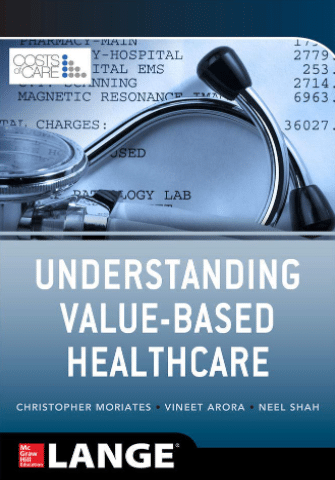
Summary:
Understanding Value-Based Healthcare is an insightful book aimed at demystifying the concept of value-based healthcare and illustrating its importance in current medical practices. The authors discuss the shift from volume-based to value-based care, addressing the need for focusing on quality, cost-effectiveness, and patient-centered care in healthcare delivery.
What You'll Learn:
This book provides readers with a comprehensive overview of the value-based healthcare system, its foundations, and its practical implications. It offers a detailed exploration of how healthcare providers can optimize the value of their services by improving outcomes and reducing costs.
Why You Should Read It:
If you are a healthcare provider, policymaker, student, or anyone interested in the evolving landscape of healthcare, this book is a valuable resource. It provides a clear and concise explanation of value-based healthcare, showcasing how it can transform healthcare delivery to be more patient-centered and cost-effective.
Quote From The Book:
"In value-based healthcare, the aim is to advance patient-centered care that is tuned to individual patient preferences, needs, and values."
About The Author:
Christopher Moriates is a passionate advocate for value-based healthcare and serves as a dedicated educator and clinician. Vineet Arora is a distinguished physician and medical educator, focusing on improving healthcare delivery and medical education. Connect with Vineet's LinkedIn. Lastly, Neel Shah is a leader in healthcare innovation and an advocate for high-value healthcare.
15. Critical Decisions: How You and Your Doctor Can Make the Right Medical Choices Together by Peter A. Ubel
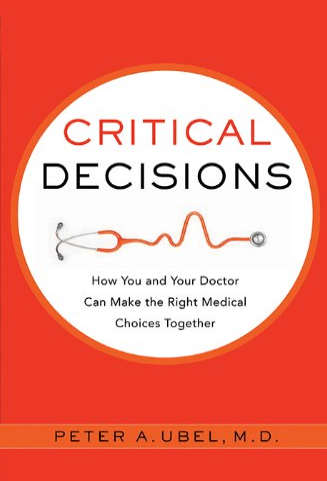
Summary:
Critical Decisions is a compelling book that delves into the complexities of medical decision-making. It explores the intersection of doctor-patient relationships and the decision-making process, addressing the challenges and misunderstandings that often arise. Ubel sheds light on how both parties can collaborate to make informed, ethical, and balanced medical choices, putting an emphasis on shared decision-making and effective communication.
What You'll Learn:
In this book, readers will learn about the nuances of medical decisions and the importance of doctor-patient collaboration in making these decisions. Ubel provides insights into the psychological and social factors that influence medical choices and offers practical advice on how to navigate through complex medical information.
Why You Should Read It:
Critical Decisions are crucial for anyone interested in understanding the intricacies of medical decision-making. It's not just a guide for patients but also an essential read for healthcare providers seeking to enhance their communication and decision-making skills.
Quote From The Book:
"Good medical decisions depend as much on good communication as they do on good science."
About The Author:
Peter A. Ubel is a physician and behavioral scientist renowned for his research and insights into healthcare and medical decision-making. Connect with him on LinkedIn.
16. The Checklist Manifesto: How to Get Things Right by Atul Gawande
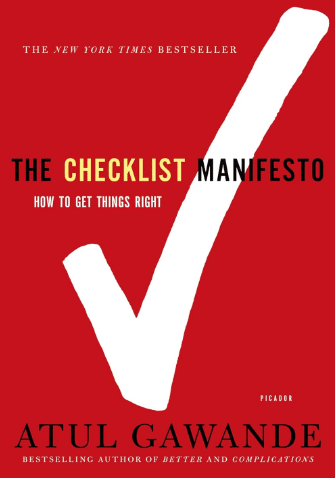
Summary:
The Checklist Manifesto by Atul Gawande is a thought-provoking book that explores the concept of using checklists as a means to manage complexity and avoid failure in the modern professional world, particularly in the medical field. Gawande, a renowned surgeon, and writer, presents a compelling case for adopting checklists in medicine, citing real-world examples and research to demonstrate how they can help professionals avoid mistakes and improve outcomes.
What You'll Learn:
In this insightful book, Gawande explains the role of checklists in ensuring precision and minimizing errors in various fields such as aviation and construction, and how these principles can be applied to medicine. Readers will learn the value of simplicity in managing complex tasks and processes.
Why You Should Read It:
Understand the transformative power of checklists in addressing complexity and fostering improvement in various professional domains. The book is particularly pertinent for medical professionals, offering valuable insights and practical solutions to enhance reliability and care quality in healthcare settings.
Quote From The Book:
"Under conditions of complexity, not only are checklists a help, they are required for success. There must always be room for judgment, but judgment aided—and even enhanced—by procedure."
About The Author:
Atul Gawande is a renowned surgeon, writer, and public health researcher. He practices general and endocrine surgery at Brigham and Women’s Hospital in Boston, Massachusetts, and is a professor at the Harvard T.H. Chan School of Public Health and Harvard Medical School.
17. How Doctors Think by Jerome Groopman
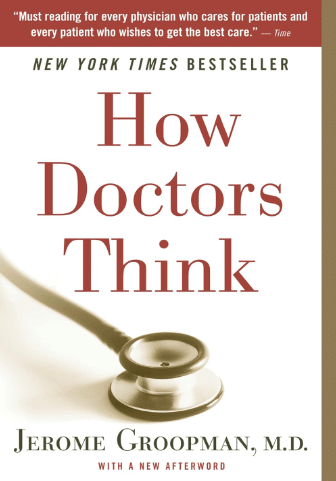
Summary:
How Doctors Think is a seminal book by Dr. Jerome Groopman that provides an in-depth exploration of the cognitive processes of doctors while making diagnoses. It gives a compelling insight into the influences and biases that can impact a doctor's judgment, highlighting real-life cases where thinking processes have both succeeded and failed.
What You'll Learn:
Readers will delve into the intricate mechanisms of medical thinking and decision-making processes, gaining a clear understanding of how biases, quick judgments, and other factors can impact a doctor's diagnosis and treatment choices. The book elucidates how various elements, such as a doctor’s past experiences, pressures, and the patient-doctor relationship, can play crucial roles in the thinking process.
Why You Should Read It:
How Doctors Think is an essential reading for healthcare professionals and patients alike, offering a profound exploration of the intricacies of medical thinking. It uncovers the human side of medicine, allowing readers to comprehend the psychological aspects that underlie the decision-making process in clinical practice.
Quote From The Book:
"Good medicine begins with a clear understanding of the most sophisticated technology of all, the human mind."
About The Author:
Jerome Groopman is the Dina and Raphael Recanati Chair of Medicine at Harvard Medical School, Chief of Experimental Medicine at Beth Israel Deaconess Medical Center, and a staff writer for The New Yorker.
Which Books For Starting A Medical Practice Do You Recommend?
I value your insights and I am always looking to expand my collection of valuable resources. If there are books you’ve found impactful that I haven’t included, I invite you to share your recommendations. Your input is crucial in assisting both me and other readers in discovering new and insightful reads.
To stay updated on the latest trends, best practices, and solutions related to your medical practice, subscribe to The Medical Practice newsletter.

